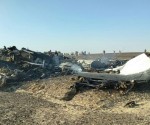Hillary Clinton’s Benghazi Emails Released
Hillary Clinton, the leading 2016 Democratic presidential candidate, faced questions from media regarding 900 pages of her personal emails released by the State Department, including one partially redacted at the FBI’s request considering it to be containing classified material.
All of the released documents contained classified information related to the attack of the U.S. Consulate in Benghazi, Libya, in which the U.S. Ambassador Christopher Stevens and three other Americans were killed, on 11th September 2012.
The former Secretary of State received information about the attack on U.S. diplomatic facilities in Benghazi on her private email account, information which was later classified as “secret” at the FBI’s request, this invited suspicion over how she dealt with sensitive information on her home server.
In March, Clinton said that no classified information through her home account was sent. Earlier Friday, the State Department released 900 pages and partially redacted one email exchange because it did contain classified material.
When asked if she was concerned it was on a private server, she replied, “No”.
“First of all, I’m glad that the emails are starting to come out,” Clinton said. “This is something that I’ve asked to be done for a long time, and those releases are beginning. I want people to be able to see all of them, and it is a fact that we have released all of them that have any government relationship whatsoever. In fact, the State Department had the vast majority of those, anyway, because they were sent to ‘dot-gov’ accounts.”
The classified email from her deputy chief of staff, Jack Sullivan, includes reports of arrests of possible suspects in Libya.
“It was not classified at the time. The occurrence of subsequent upgrade does not mean anyone did anything wrong,” said Marie Harf, the State Department spokeswoman.
The mails released on Friday were a small part of more than 55,000 pages of emails Clinton has turned over to the State Department, which had its plan to release all in January, which the federal judge rejected.
The judge ordered to carry out “rolling production” of the records. The slow rolling production of emails will probably keep the issue alive for a much longer period.
Released emails were incomplete, Republican Committee chairman Trey Gowdy said that it “strains credibility” to view them as a thorough record of Clinton’s tenure.
Clinton’s choice to use a personal email account instead of one issued by the government has led to political complications.
Clinton said, on Friday, she was aware that the FBI now wanted some of the emails to be classified, “but that doesn’t change the fact all of the information in the emails was handled appropriately,” Campaigning in Hampshire.
It is unclear if Clinton’s home computer system encrypted government email services, to protect foreign spies, hackers, or the Internet. Hillary Rodham Clinton has said that the private server had “numerous safeguards.”
Clinton gave 55,000 pages of emails to the State Department, last year, relating to her work as secretary sent from her personal address. Messages related to the 2012 attacks in the Benghazi US consulate, that killed four Americans, including U.S. Ambassador Christopher Stevens, were only released by the department on Friday. The 296 emails had already been handed to the House Benghazi committee.
There were warnings of unrest in Libya a number of times, though Clinton was never personally involved with security issues in Benghazi before the attack. A message was received of a one-day trip by Stevens in March 2011 to “get a sense of the situation on the ground” and preparation for a 30-day stay in the future. A request for support from the Defense Department was made, the email adds, but no approval had yet been received. Stevens was killed in Benghazi on 11 September 2012.
In April 2011, Clinton was forwarded a message which had been sent to her staff saying that the country’s situation had gotten worse to the point “where Stevens is considering departure from Benghazi,” The email was marked “Importance: High.”






